How the 1000-year-old French monarchy was destroyed
230 years ago, an uprising took place in Paris - one of the landmark events of the French Revolution. The second revolution led to the fact that the monarchy that had existed in France for about a thousand years was overthrown.
"After us, at least a flood"
By the time of the accession of Louis XVI to the throne in 1774, the position of the kingdom was already unsatisfactory. France was in a severe crisis. Louis XV (1715–1774) left an empty treasury and large debts. His mistresses ruined the country. The Seven Years' War ended with the defeat of France. The French lost their vast possessions in North America (Canada, lands in the Mississippi Valley) and abandoned expansion in India. French naval power was undermined. Having received the entire eastern half of North America into its undivided possession and consolidating its monopoly in India, England turned into the leading colonial power and began to push France as the advanced power of the Western world.
The country's finances were in complete ruin. The main reason is chaos, disorder in the financial system, abuse, corruption, theft on a huge scale and the extravagance of the royal court. This led to a policy of introducing new taxes and, accordingly, the resistance of the Parisian and provincial parliaments. The king compelled parliament through the principle of lit de justice - the supremacy of the royal court over any other, according to which, as soon as parliament decides in the name of the king, then in the presence of the king himself, parliament has no right to do anything. What caused the opposition of the king and parliament, the upper classes (nobility and clergy) with the third estate, which, in fact, paid all taxes.
The top of the third estate (bourgeoisie) had representation in the States General, and also dominated the Parisian and provincial parliaments and tried to change the political, economic, legal situation in the country in their favor. The bourgeoisie had money, capital, and wanted to have privileges, power, and become the new nobility.
Revolutionary situation
By the beginning of the reign of Louis XVI, the peasants were starving, the province was engulfed in unrest due to the high cost of bread (the so-called “flour war”). Louis XVI, unlike his grandfather Louis XV, was not a depraved person, but he was not distinguished by state talents and determination. He understood that fundamental reforms were needed, persistent actions to improve finances, the economy as a whole, solve social problems, etc. However, he was a weak-willed person, could not overcome the influence of the court, environment, relatives, ministers, wife (Marie Antoinette of Austria) and her "friends" who lived for entertainment and enrichment. The dissolute, greedy and parasitic court camarilla in every possible way prevented any positive undertakings of the king.
Louis tried to push through the reforms, first with the help of Minister Turgot, then Necker. But this attempt ran into strong resistance from the court, the aristocracy, the clergy and parliament, they did not want to give up the feudal system that dragged the country into the past, their rights and privileges, they did not want to pay for the development of the state and the people. The king surrendered the more decisive Turgot already in 1776, the more cautious Necker held out until 1781. It was not possible to establish order in the treasury and the economy.
Most of the reforms already carried out aimed at the development of the country, its economy, the elimination of old prohibitions and restrictions, were canceled. Everything went the same way. Moreover, the nobles revived the medieval requisitions that had already gone into the past. This led to the fact that the peasantry and the lower classes of the city, disappointed with the policy of the new king, and Louis at first showed great promise, were mentally prepared for a large-scale peasant war.
Enlightenment ideas played a big role in the future revolution. In essence, France was informationally prepared for the revolution, for the transition to the capitalist rails. Various secret organizations, lodges and clubs developed rapidly, in particular, Freemasons and the Illuminati. France, as the most populous and developed country in Western Europe, was to become the basis for the transfer of the monarchical, feudal Western world into a new socio-economic formation - bourgeois-capitalist, liberal-republican. They were going to “cut off” the old elite, destroy most of it, and the place of aristocrats and nobles was to be taken by new nobles - bankers, usurers, large merchants and speculators, shipowners, slave traders and industrialists. Also, the revolutionary order was going to destroy the old religion, morality, most social institutions.
Almost all segments of the population were prepared for "changes". The bourgeoisie wanted to become a new nobility, to receive rights and privileges, to abolish the old restrictions. The third estate did not like the restrictive, tax policy of the authorities. For example, in 1781 a law was issued that allowed access to officer ranks only to nobles who could prove the antiquity of the family (except artillerymen and engineers). The bourgeoisie was hindered by feudal restrictions, the rights of the nobility and the clergy. In 1786, the French authorities signed a trade agreement with England, which opened access to the domestic market for cheaper English goods. This led to the unemployment of hundreds of thousands of people and the ruin of thousands of trading houses and enterprises.
The French elite (royal court, nobility and spiritual feudal lords) experienced an extreme degree of decomposition and could not bring the state out of the crisis. There are almost no statesmen, people of duty and honor left. And those who still tried to create, drowned in a common swamp. Intrigue, selfishness, hedonism, vice and the pursuit of money were completely prevalent in high society.
General States
Hedonism, a policy of wastefulness, when huge funds went not to develop the country, colonies, cities, army and fleet, not for the construction of new fortresses, factories and ships, but for entertainment and a vicious life, led to a huge debt. Current expenses were covered by new loans. By 1789, the public debt had become simply monstrous (at that time) - 4,5 billion livres. The treasury could not pay interest on old loans, it was more and more difficult to get new ones. The deficit reached 198 million livres a year. The business was headed for bankruptcy.
In 1787, an economic crisis began, caused, in particular, by an erroneous trade agreement with England. Simultaneously, the kingdom experienced another crop failure, exacerbating widespread poverty and famine. In 1788 - early 1789, spontaneous peasant riots took place in a number of French provinces. In the spring of 1789 the situation worsened. The cities of Lille, Cambrai, Dunkirk, Toulon, Marseille and others began to join the peasant uprisings. Workers revolted in the Faubourg Saint-Antoine of Paris. The people demanded bread, low food prices.
The then ministers of finance (Turgot, Necker, Calonne) believed that tax reform was necessary. But for its implementation, the support of parliaments was needed, and there the bourgeoisie prevailed, which met with hostility any encroachments on its wallet. The king, finding himself in a hopeless situation, convened in 1787 a meeting of notables (meetings of a group of high-ranking nobles, clergy and government officials). Such an assembly had no legislative power of its own, but Calonne hoped that if it supported the proposed reforms, it would put pressure on the parliaments. The finance minister proposed four major reforms: a unified land tax; the transformation of duties into a monetary tax; abolition of internal customs duties; establishment of elected provincial assemblies.
The nobility abandoned the reform plan. That is, the stronghold of the monarchy and the kingdom - the nobles and the clergy, refused to give up their privileges in the name of the development of the state. Kalonne was dismissed. Brienne was appointed in his place, then Necker. Louis, under the threat of financial collapse and wide popular unrest, dissolved the assembly of notables. Not having the support of parliament, the king agreed to convene the States General (a meeting of the three estates, which had not been convened since 1614). Not counting on the support of the privileged estates, the monarch agreed to give the third estate dual representation.
Fermentation has already seized the whole of France. Paris and the cities were filled with all sorts of brochures, appeals, posters, rumors, there was an information pumping of society. The third estate began to demand broad political reforms, the elimination of class division, restrictions on trade and industry, and political rights (in fact, access to power).
On May 5, 1789, a meeting of the Estates General opened in one of the palaces of Versailles. The main issue was the problem of voting: should the States retain their old estate form, when deputies voted by estates. Then the clergy and the nobility retained the advantage - two votes to one. Or make a decision by majority vote. Negotiations began, no one wanted to compromise.
This caused outrage in the street, where concrete steps were expected, not chatter. The House of Commons (an assembly of the third estate), with the support of the lower classes of society, on June 17 proclaimed itself the National Assembly - the highest legislative and representative body of the French people. Representatives of other estates were invited to join the meeting. The lower clergy decided to support this decision.
Revolution
The king, under pressure from the court and the aristocracy, at a royal meeting on June 23, ordered the restoration of the old order and voting by estates. The National Assembly refused to obey. Then Louis yielded and asked the nobility and clergy to unite with the third estate. The hesitation and indecision of the monarch only added fuel to the fire. The situation went haywire. On July 11, the king again dismissed Necker, which caused discontent among the general public.
An army was concentrated near the capital, but Louis did not dare to start a civil war (although in the past the kings did not hesitate to bleed the rebels). Paris responded with an uprising. On July 14, the Bastille was captured by the rebels. The Minister of War, Marshal de Broglie, suggested that Louis lead the loyal troops and retire to the provinces that remained under control. The king refused, signing the verdict of the monarchy and himself.
On July 15, Louis went on foot to the National Assembly and declared that he and the nation were one and that the army would be removed from the capital. On July 17, the king approved the formation of the National Guard. On July 18, he approved the decree of the National Assembly on the elimination of the foundations of the feudal system. After the October 5–6 uprising, Louis was forced to move to Paris, where he was under the control of the revolutionaries. The monarch fell into complete apathy, in fact, he no longer reigned, but was only present at the radical breakup of France. Louis could only draw up deliberately failed plans for coup d'état and secretly ask for help from foreign powers. The attempt to escape the royal couple in June 1791 also failed. On September 14, 1791, Louis took the oath of a new constitution.
New revolutionary situation
Meanwhile, the situation inside France, as well as its foreign policy situation, was deteriorating. The revolution itself did not improve the condition of the people. Moreover, the life of ordinary people even worsened. The old life was destroyed, but the new one has not yet been established. Many representatives of the nobility and clergy fled the country, and they were the main customers of luxury goods, the center of production of which was Paris. This led to the ruin of thousands of small businesses, artisans and workers. Thousands of servants were left without work. The construction sector has shrunk, and there are no former customers. The redistribution of noble and church land began, but the main benefit was received not by the peasants, but by the bourgeoisie. Old exploiters have been replaced by new ones.
The issue of paper banknotes increased, which led to the depreciation of paper money and an increase in prices. An uprising took place in Santo Domingo, Paris lost its massive colonial goods - tea, coffee and sugar. The rapid rise in prices for other foodstuffs also continued. The high cost and food problems hit first of all on the pockets of the poor strata of the population (most of the people). People again began to demand fixed prices and the punishment of speculators.
As a result, the former secular and spiritual feudal lords were replaced by a new "elite" - merchants, usurious bankers, money changers and speculators. The suffering of the people grew. This fueled radical sentiments. The radicals demanded blood, more radical changes, the complete destruction of the former order and society.
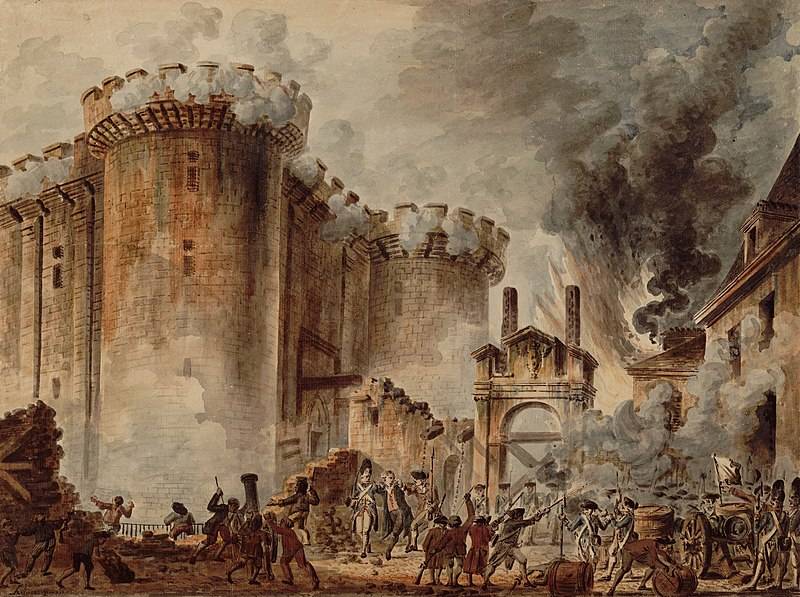
Second revolution
A series of revolutionary wars began. Austria and Prussia were preparing an invasion to crush the seat of revolution in France. It is clear that Vienna and Berlin did not want to help the French monarchy out of noble motives. They wanted to take advantage of the weakness of France: the Prussians set their sights on Alsace, and the Austrians on Belgium. England and Spain also wanted to take advantage of the weakness of the neighboring power, to take away its colonies.
In the spring of 1792, France declared war on Austria. A long, difficult and bloody confrontation began, which lasted a quarter of a century. The war worsened the economic situation of the country, the material situation of the masses. The situation at the front was extremely unfavorable. The French army retreated. The royal palace wished for defeat. Commanders, generals, senior and senior officers (aristocracy and nobility) did not want victory. Many emigrated, became in the ranks of opponents of the French Revolution. Their example was followed by many mid-level officers and even junior officers. The army lacked experienced personnel, especially gunners.
The Legislative Assembly continued to attack the royal power (its remnants). Louis was forced to disband the guard. Anti-monarchist sentiments grew in society. People believed that Louis was on the side of the interventionists. To arms all able-bodied men were called. Volunteer detachments (federates) are being formed in France.
In Paris itself, a new social explosion was brewing. Napoleon Bonaparte, who happened to be in Paris during these great events, witnessed them and wrote on May 29, 1792:
On June 14 he wrote:
Louis' refusal to sanction the decree of the Legislative Assembly against emigrants and rebellious priests and the formation of a government of monarchists (feuillants) caused a movement on June 20, 1792. Crowds of people and national guards broke into the Tuileries Palace. The king listened to the excited crowd, put on a Phrygian cap (an item of clothing for free commoners, artisans, symbolized freedom and revolution), and drank to the health of the nation. However, on the main issues, Louis did not concede.
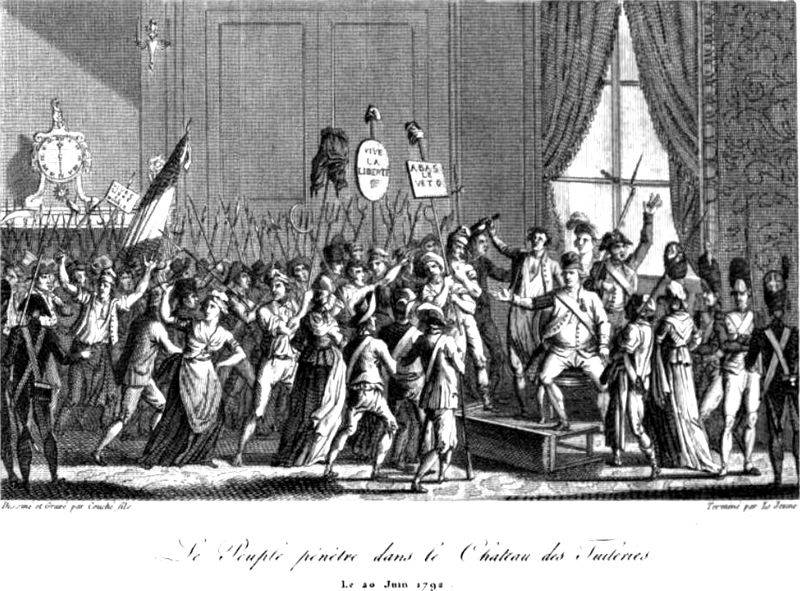
The tension grew. Radical revolutionaries - Jacobins (Marat, Robespierre and Danton) organized and directed the energy of popular discontent against the royal court. They demanded to take the king and queen as hostages, to purge the army. The calls of the Jacobin leaders were taken up by the crowd. The more moderate revolutionaries, the Girondins, had doubts. The former commander of the National Guard, a moderate monarchist, General Gilbert Lafayette, demanded that the National Assembly take action against the Jacobins. He was refused. Then he invited Louis to move under the protection of his troops to Compiègne. At the royal palace, he was received coldly, "better death than Lafayette's help," said the Queen, signing her own death warrant.
On June 23, a new revolutionary body, the Paris Commune, was created. The Girondins, frightened by the magnitude of the movement, tried to lead it in order to maintain influence and power. The last straw was the manifesto of the commander of the interventionist army, the Prussian general, the Duke of Brunswick. In Paris, they learned about him on August 3. In it, the general, on behalf of the Austrian and Prussian monarchs, announced that the purpose of the invasion was to restore the legitimate authority of the king and destroy the rebels. Parisians were warned that if the king and his family were subjected to the slightest punishment, Paris would be destroyed.
This manifesto became the occasion for a new revolution. The commissioners of the 48 sections of the capital demanded the immediate deposition of Louis XVI and the convening of a national convention. On August 5, preparations began for an armed uprising. Pétion, mayor of Paris, Roederer, prosecutor of Paris, and the Marquis of Mande, commander of the troops gathered to defend the Tuileries, guaranteed the protection of the royal family, but let Louis down. The defense of the palace was not organized.
On the night of August 9-10, bells rang over the city, cannon shots rang out. Armed people began to gather in the city sections, and then moved to the Tuileries Palace. Resistance was offered only by Swiss mercenaries (950 fighters), who did not betray their oath, and 200–300 Knights of the Order of St. Louis and other royalists. Gendarmes and national guards (about 3 thousand people) fled.
The Swiss were able to beat off the first attack and push back the rebels. But then the battalions of the National Guard entered the battle, the royalists were crushed by a numerical advantage (in addition, there was no general leadership, action plan, defense prospects). After a fierce battle, the palace was stormed. About 600 Swiss fell in battle. The total losses of the royalists are about 800 people. Some were killed after they were taken prisoner.
The King placed himself under the protection of the Legislative Assembly. The revolutionary Commune became the master of the situation in the city. The Legislative Assembly placed Louis in the Luxembourg Palace, but by decision of the Commune he was imprisoned in the Temple Castle. The monarch was accused of plotting against the freedom of the nation and of a number of attempts on the security of the state.
The convocation of a national convention was announced, elected by two-stage elections by all men over 25 years old (then the age limit was lowered to 21 years). All the old ministers were fired and a new ministry was created. Most of them were Girondins. One of the first decisions of the Convention was the abolition of the monarchy. On December 11, 1792, the trial of the king in the Convention began. On January 21, 1793, Louis was executed. The monarchy that had existed in France for about a thousand years was destroyed.
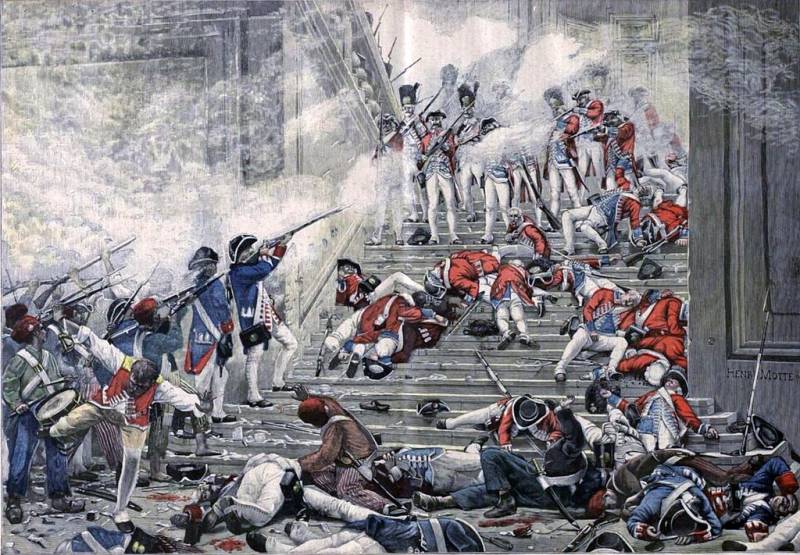
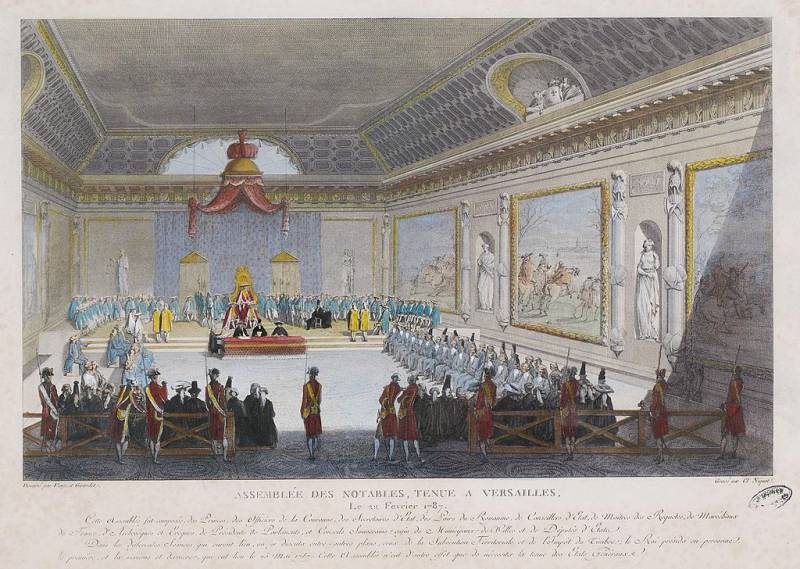
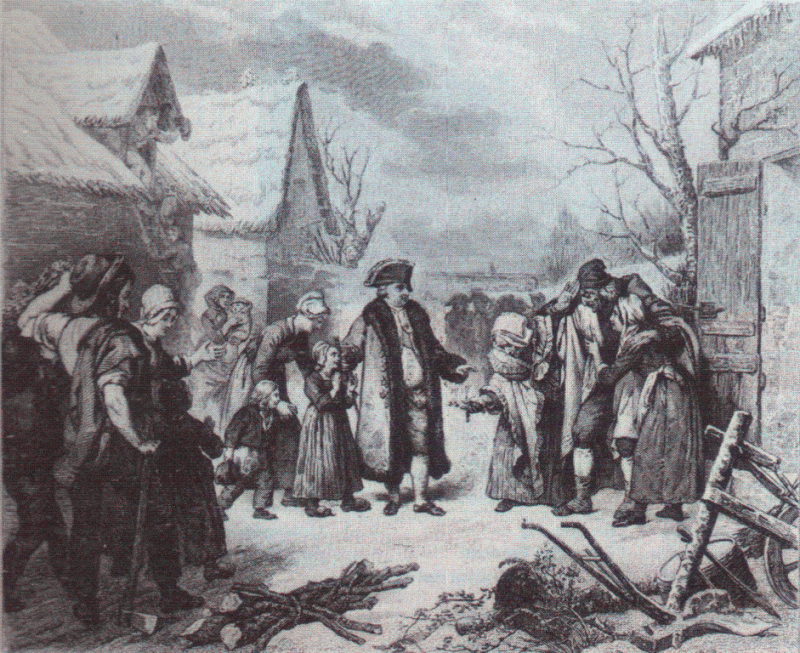
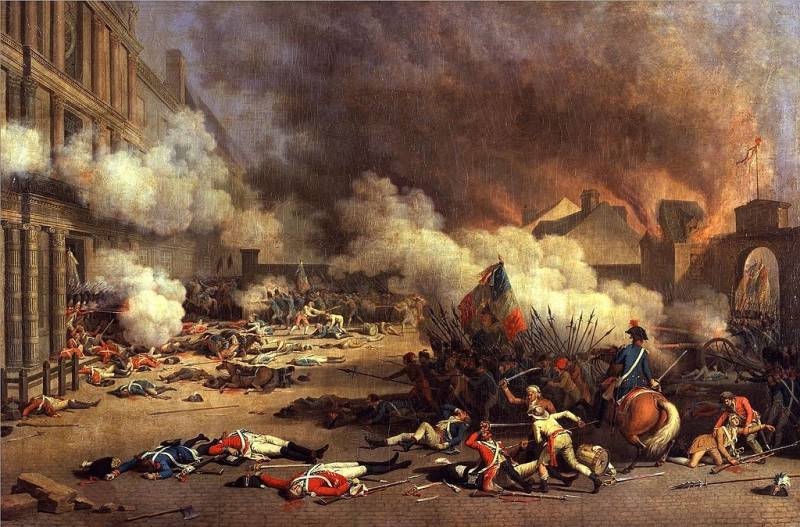
Information